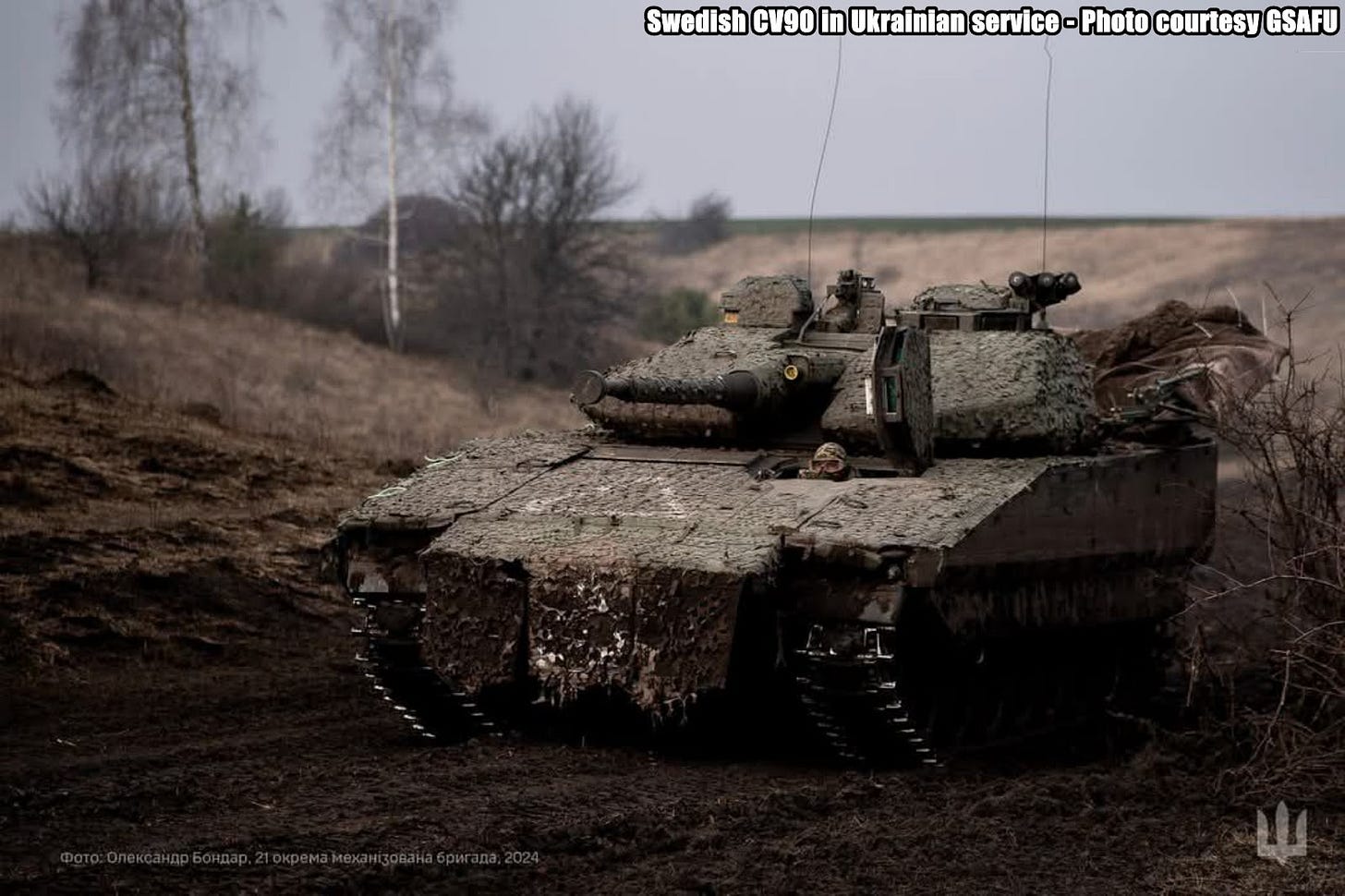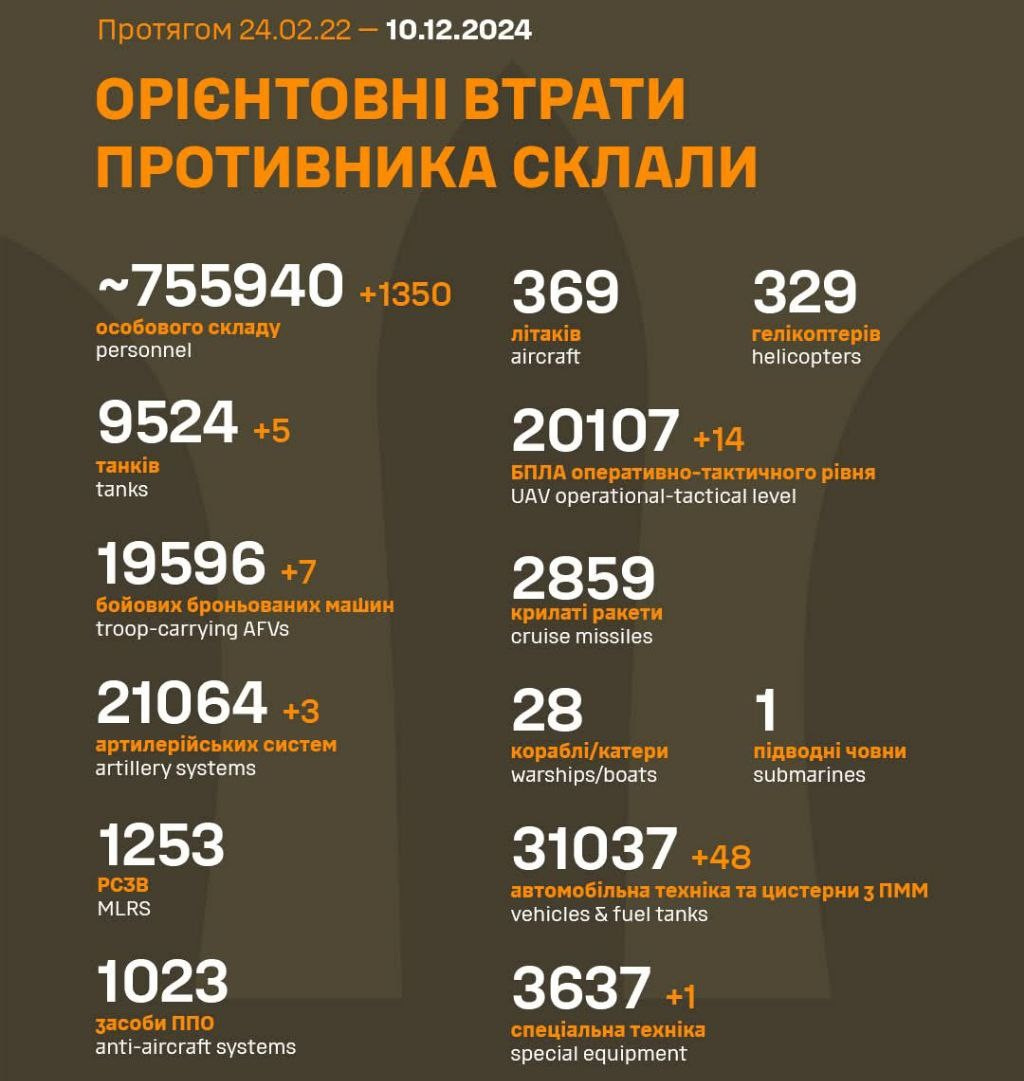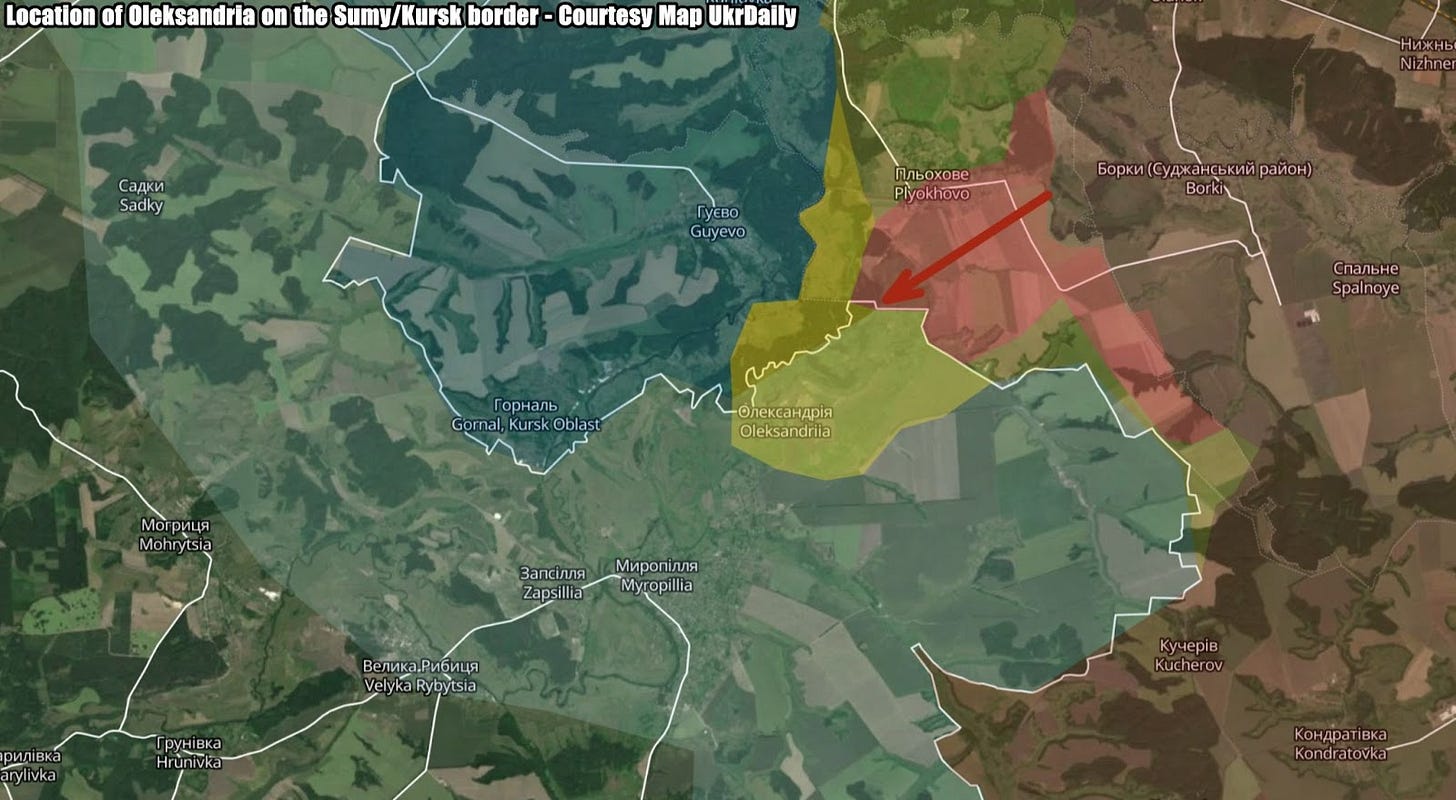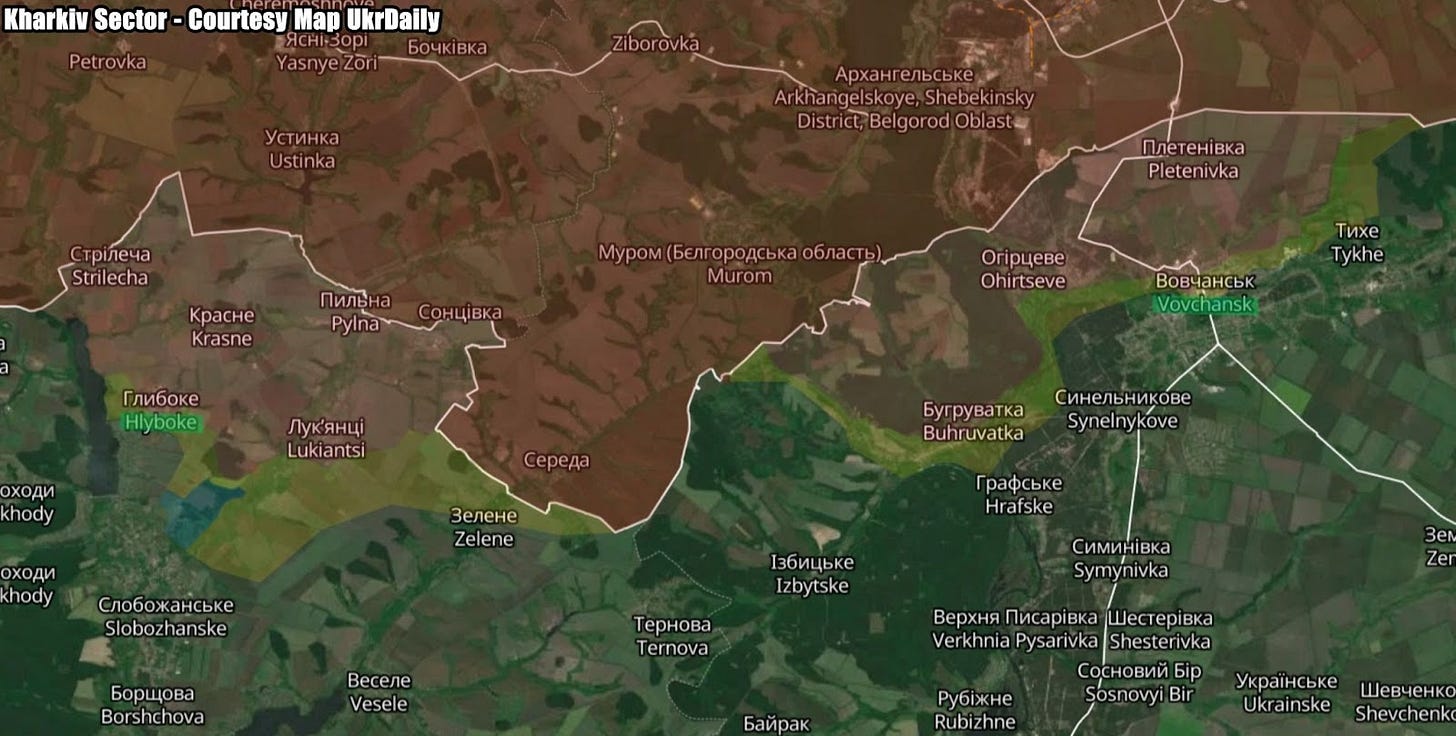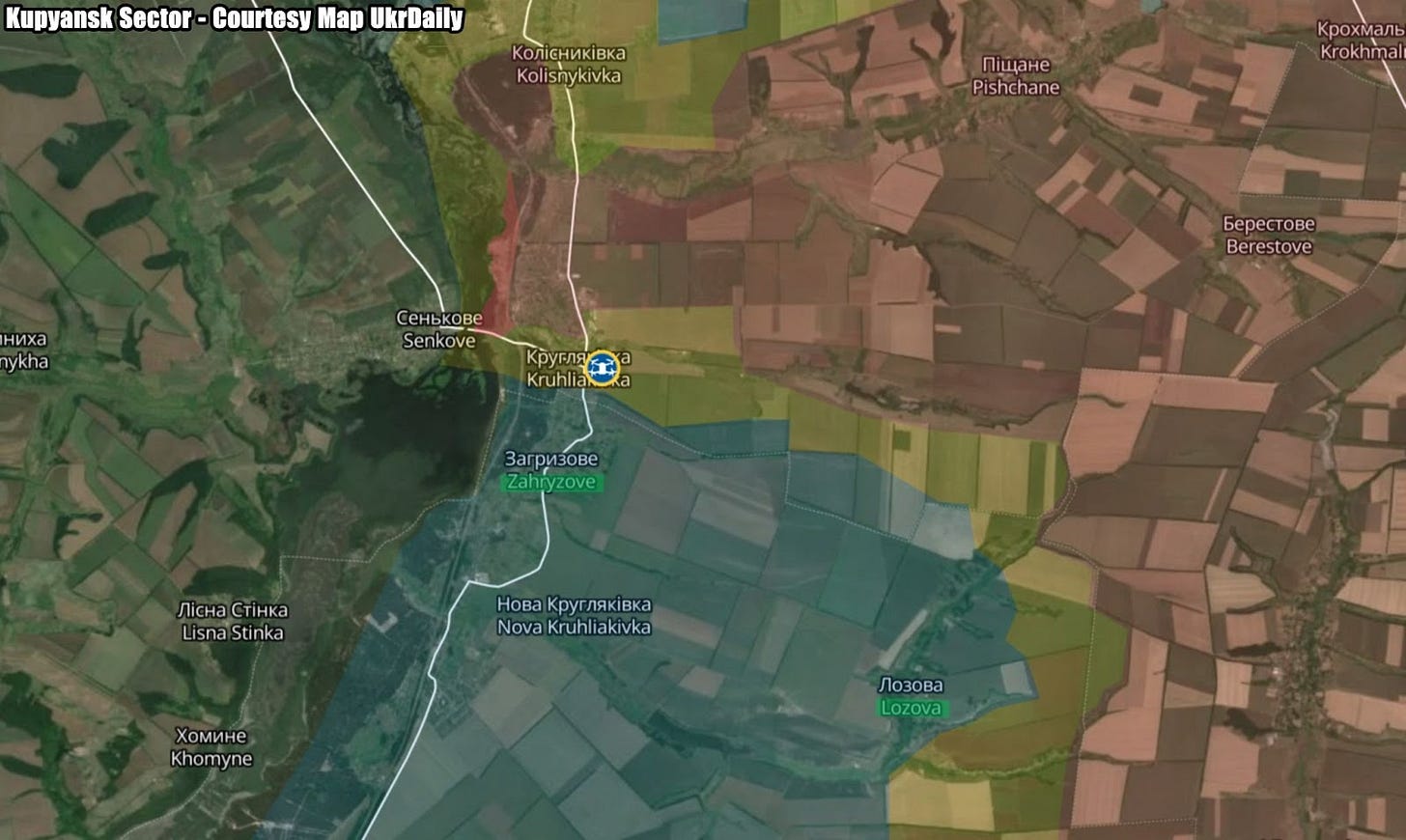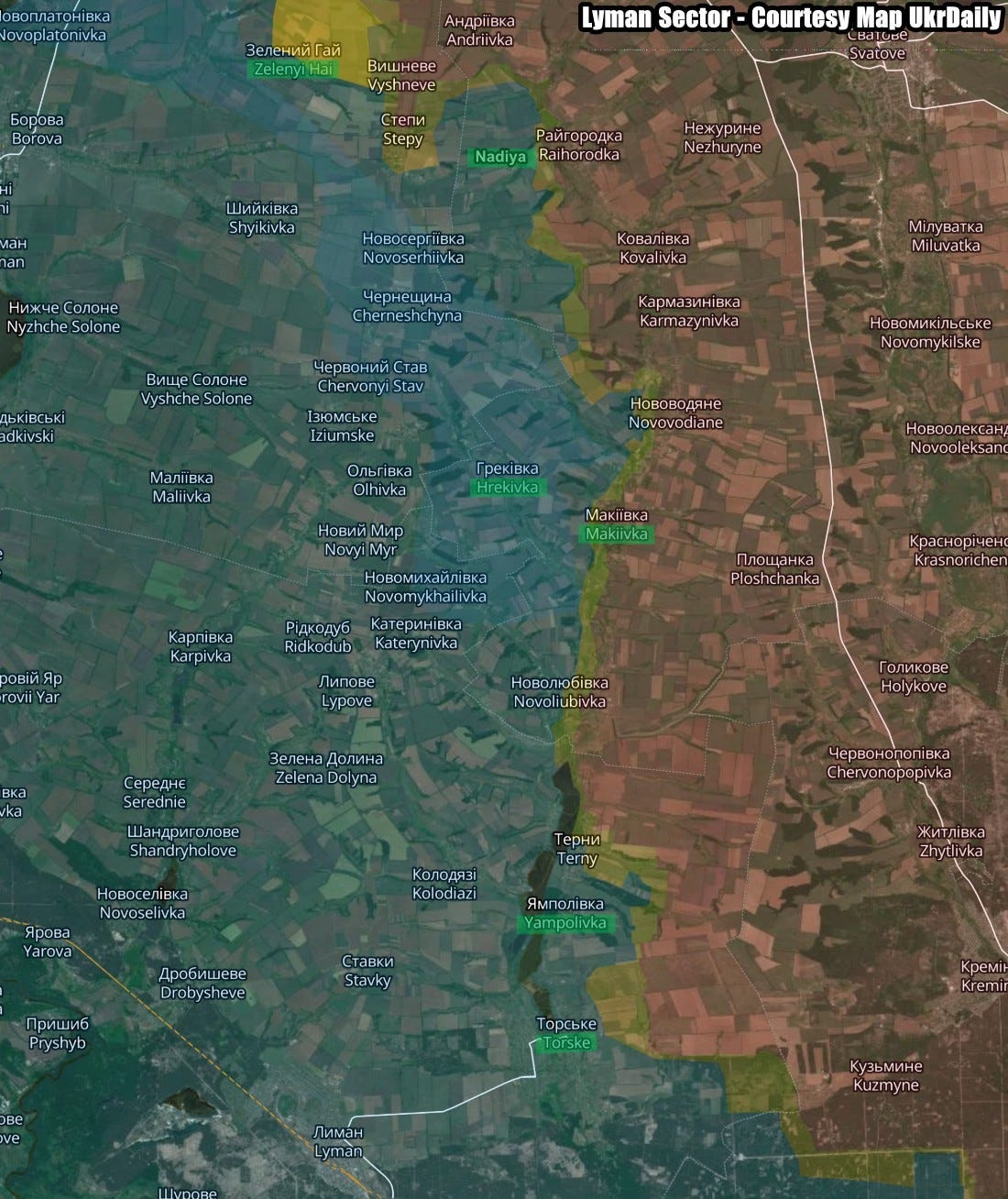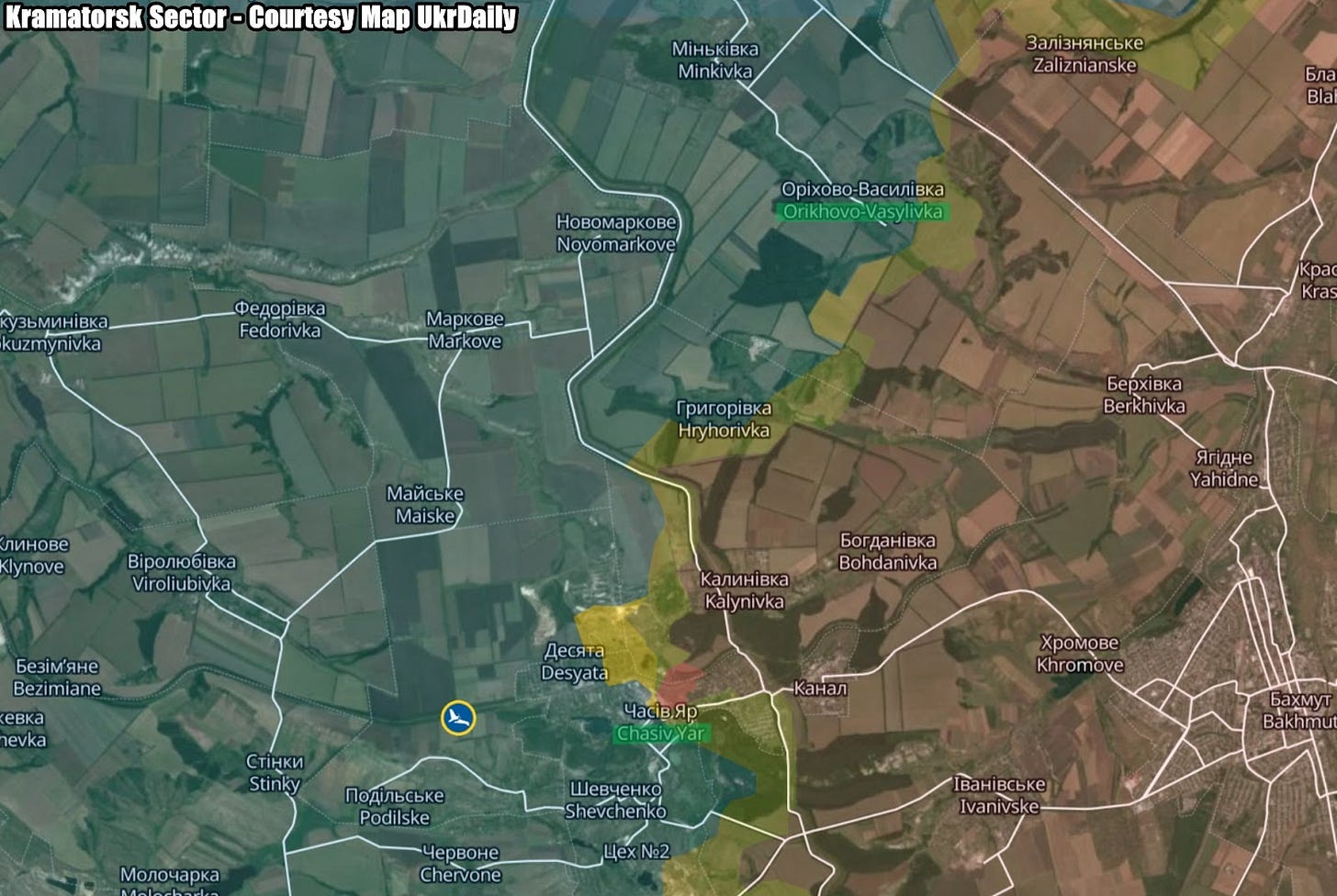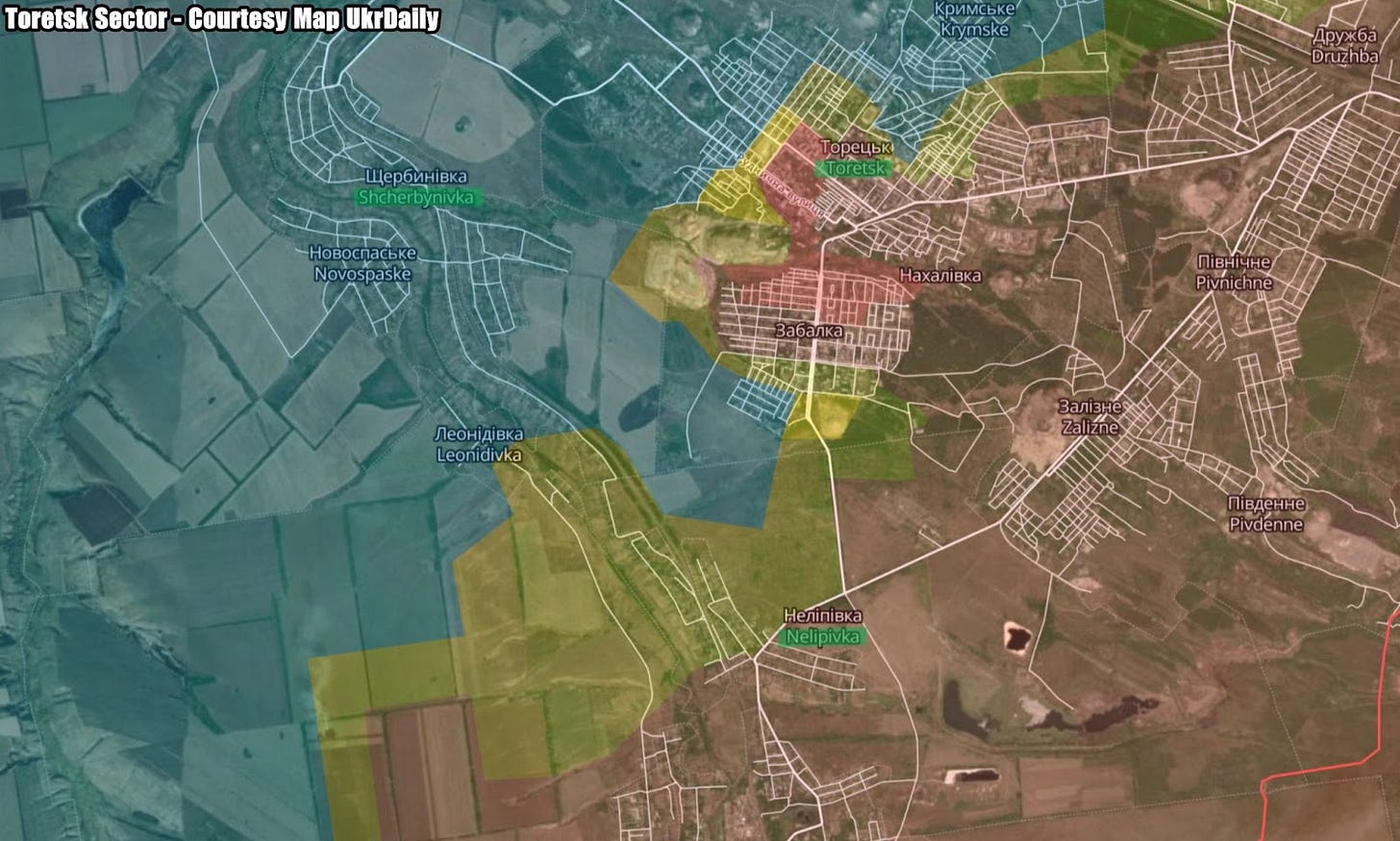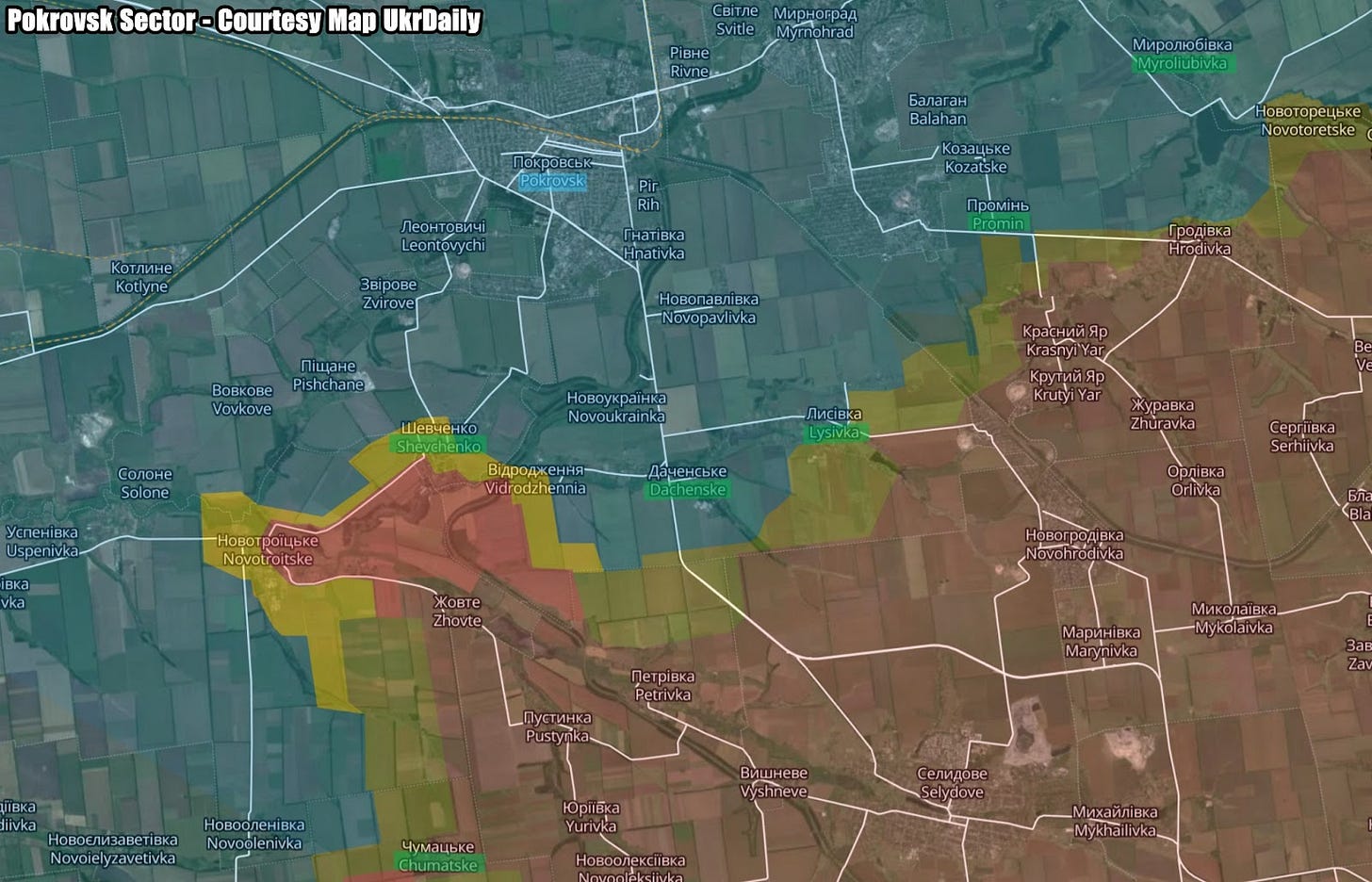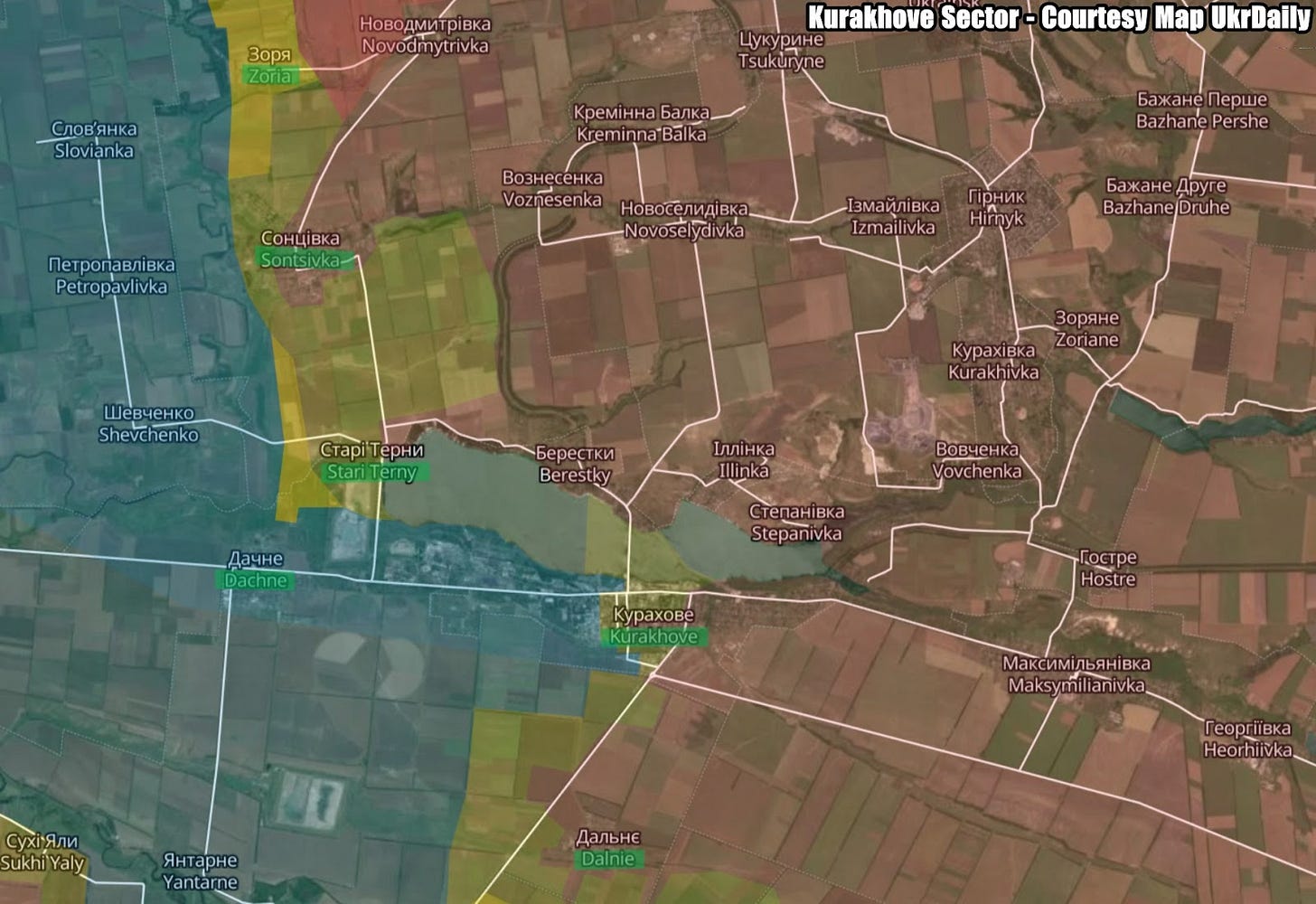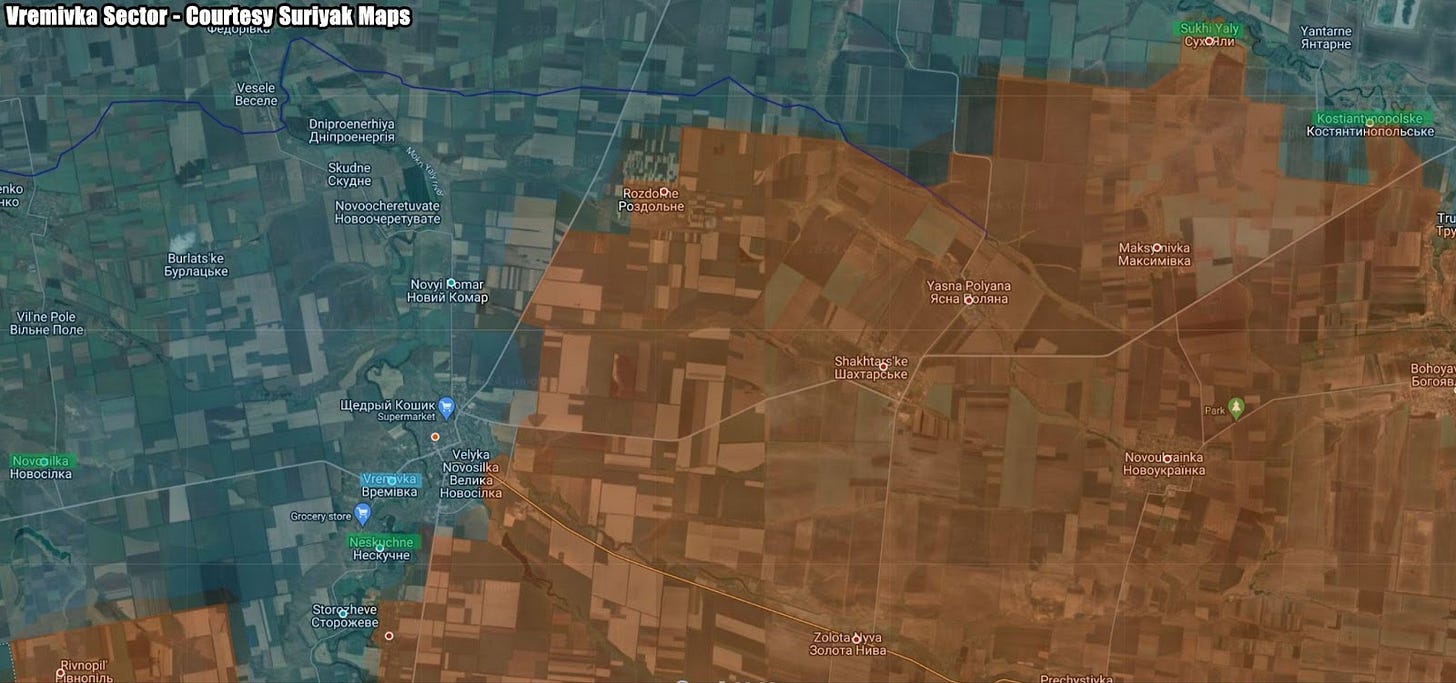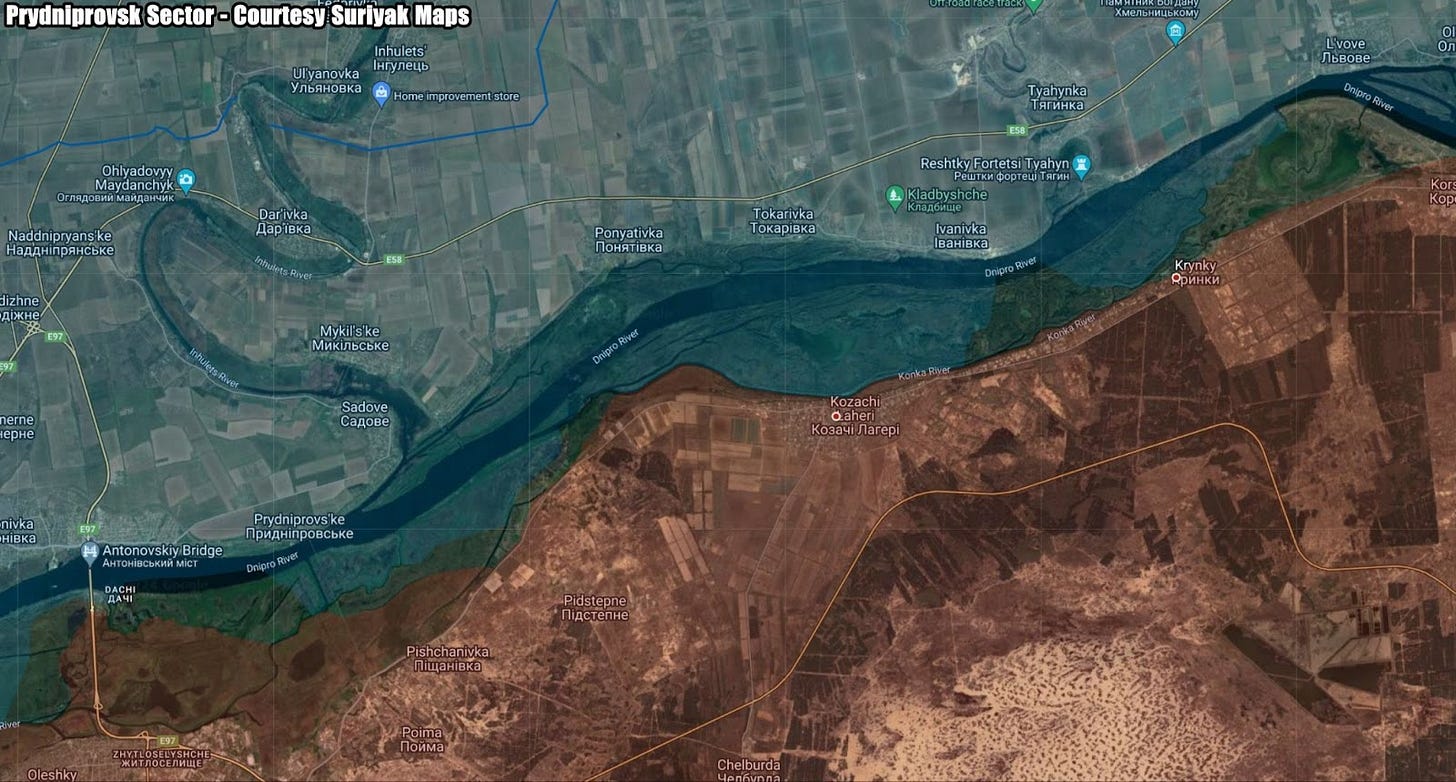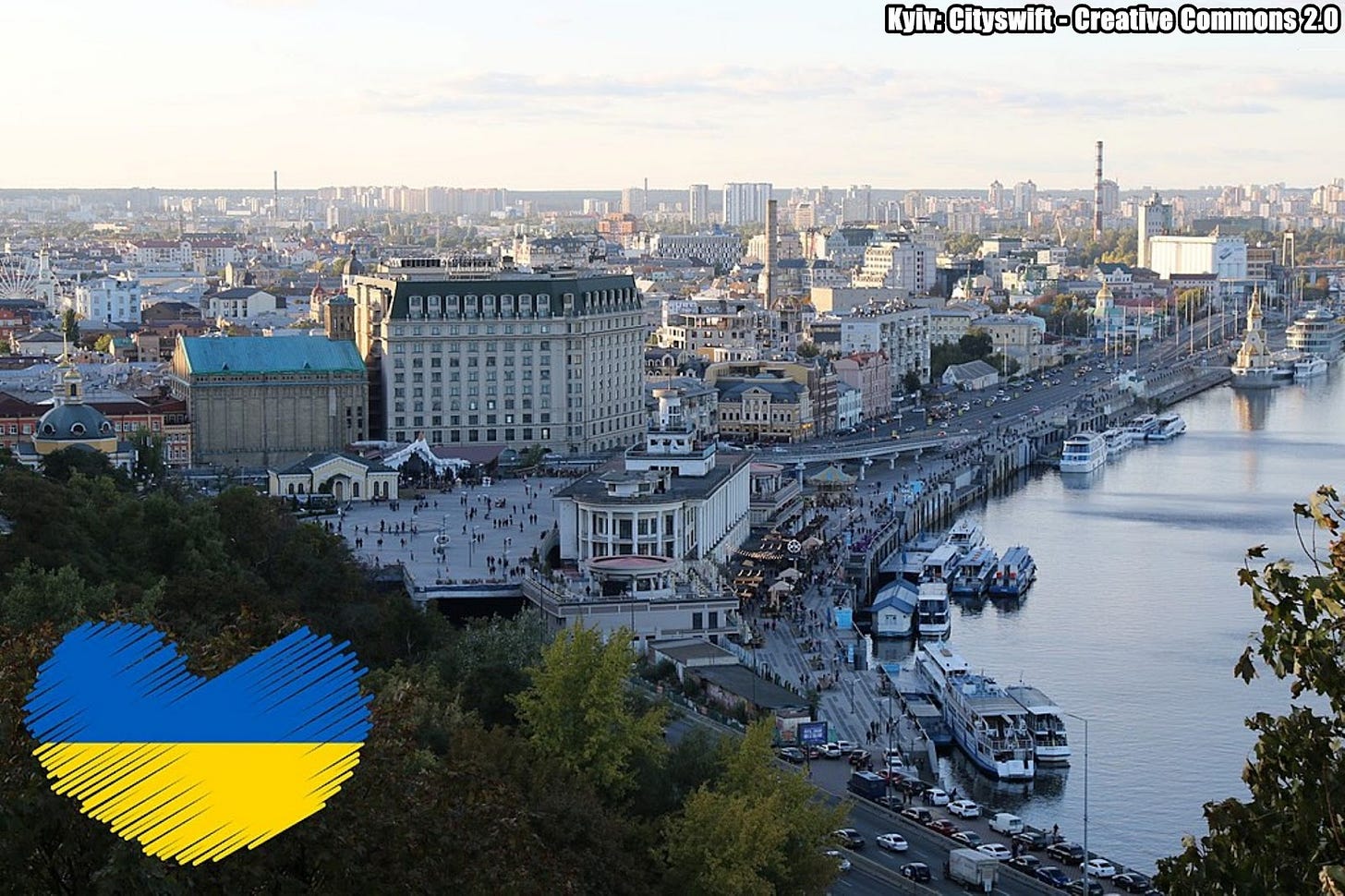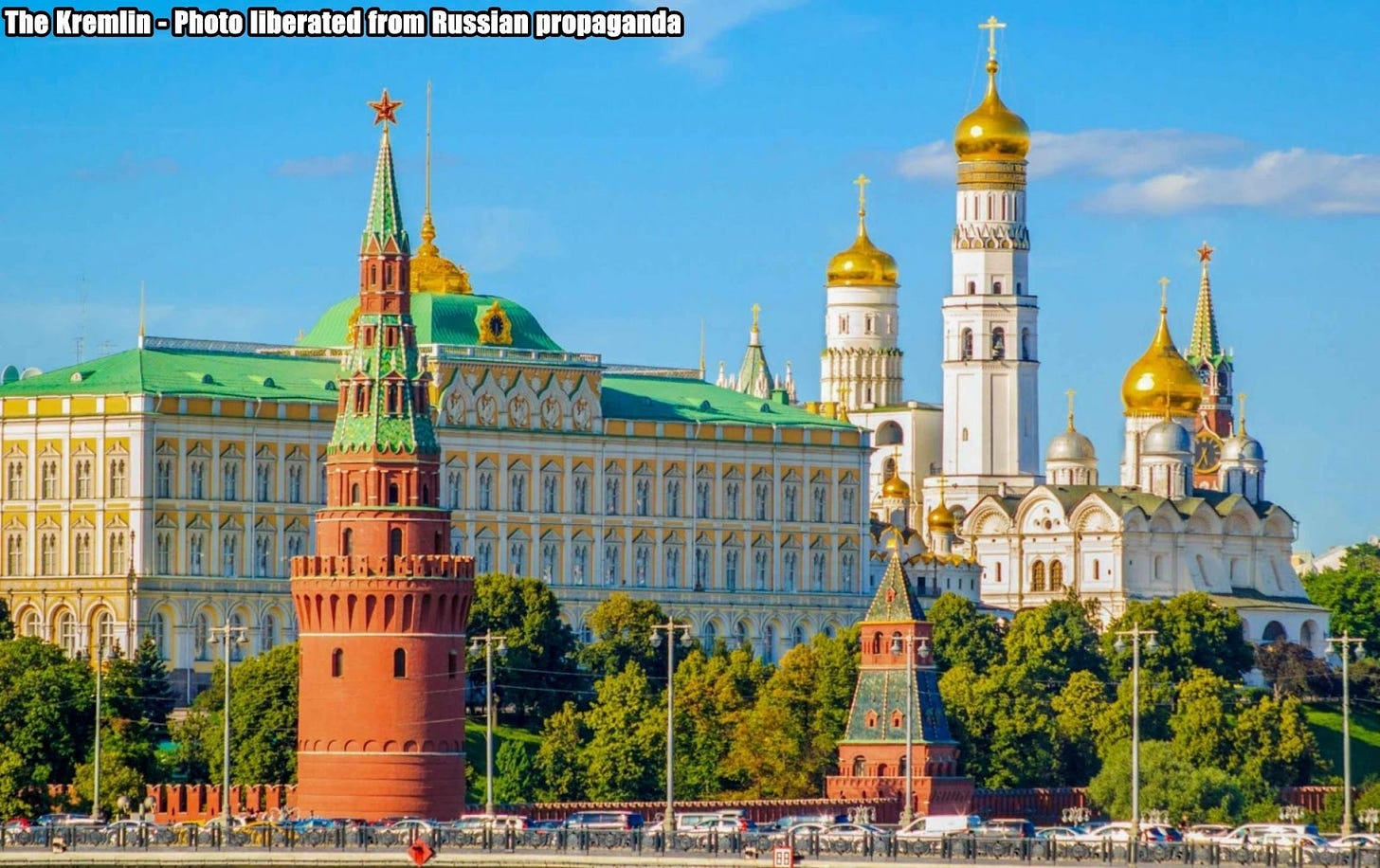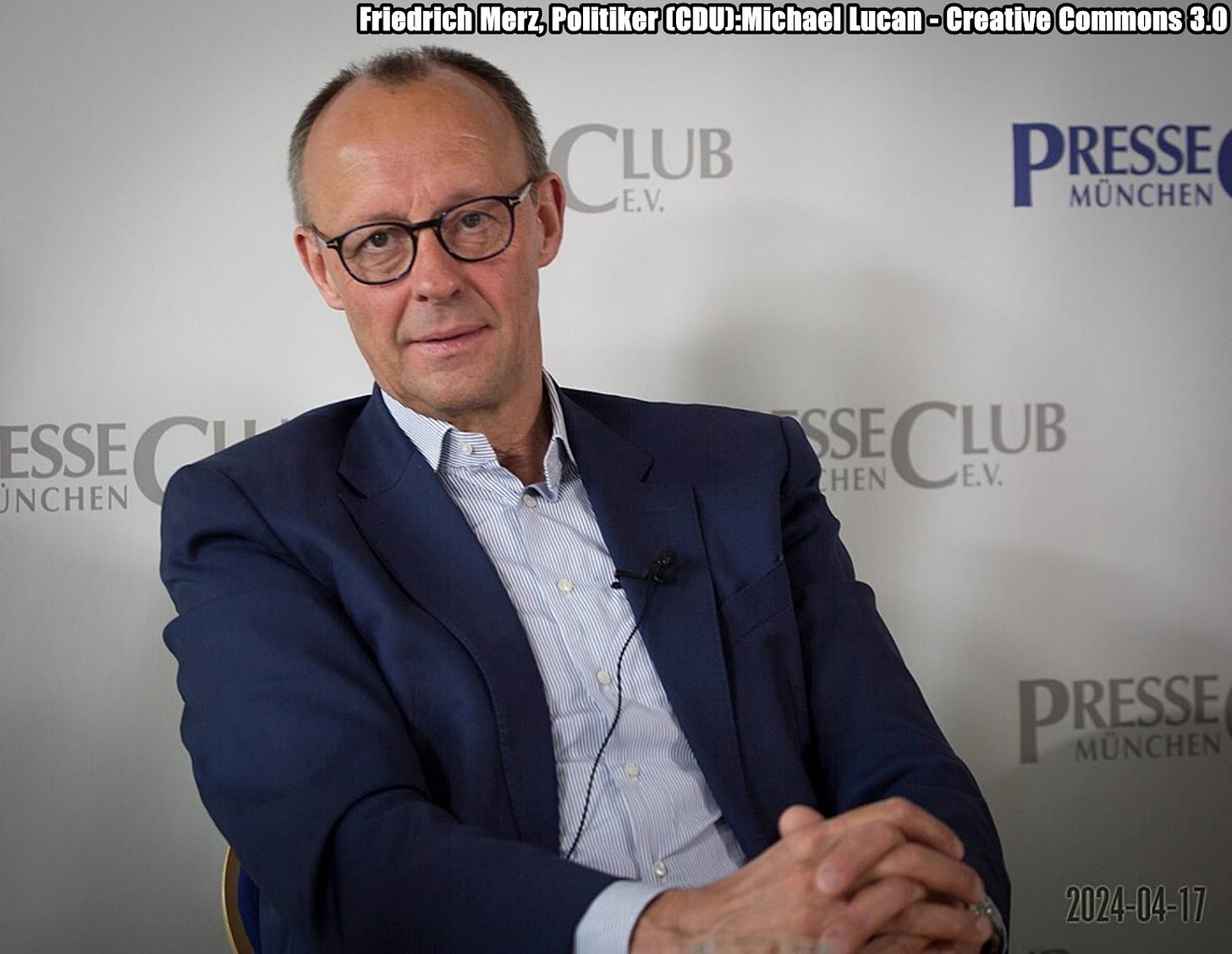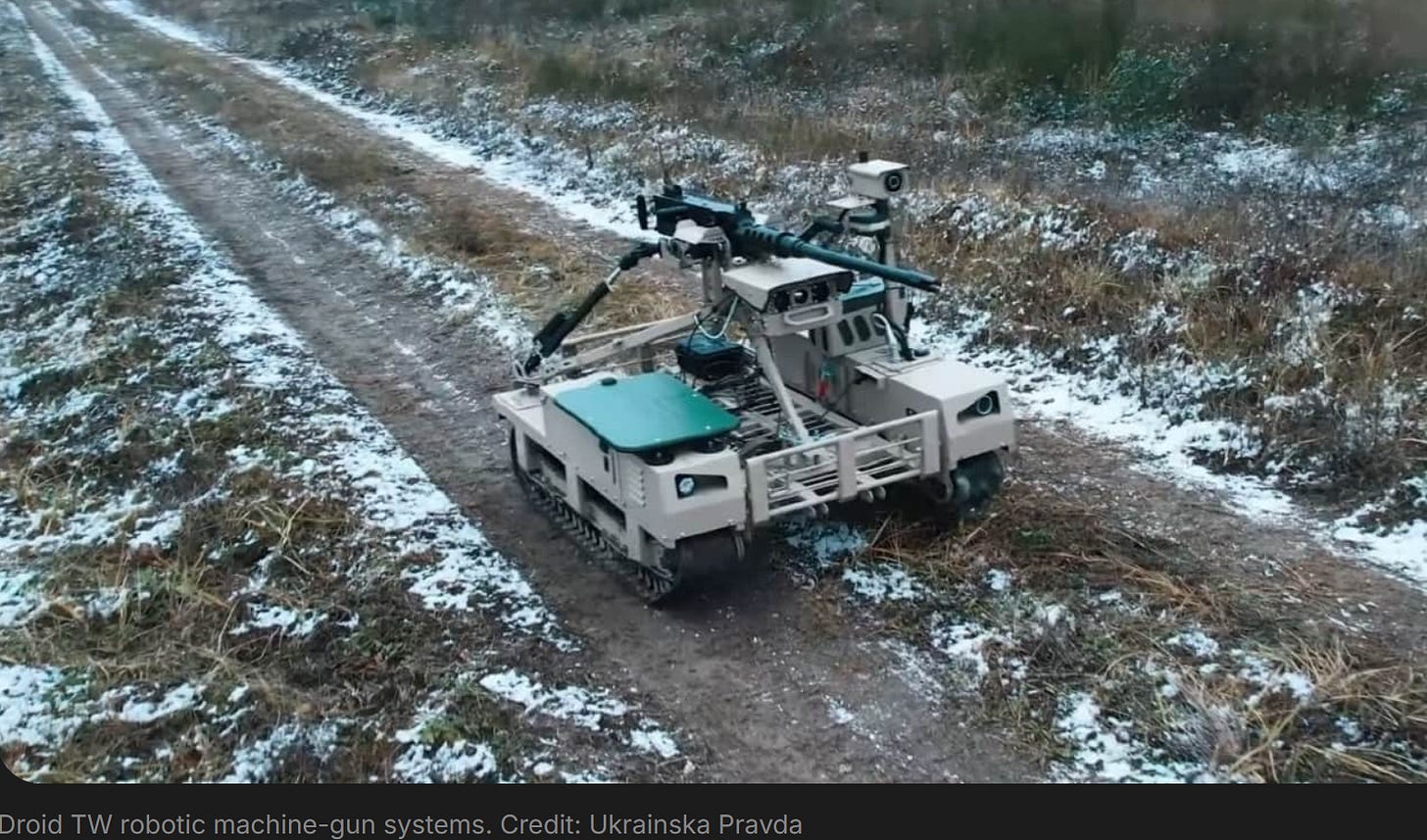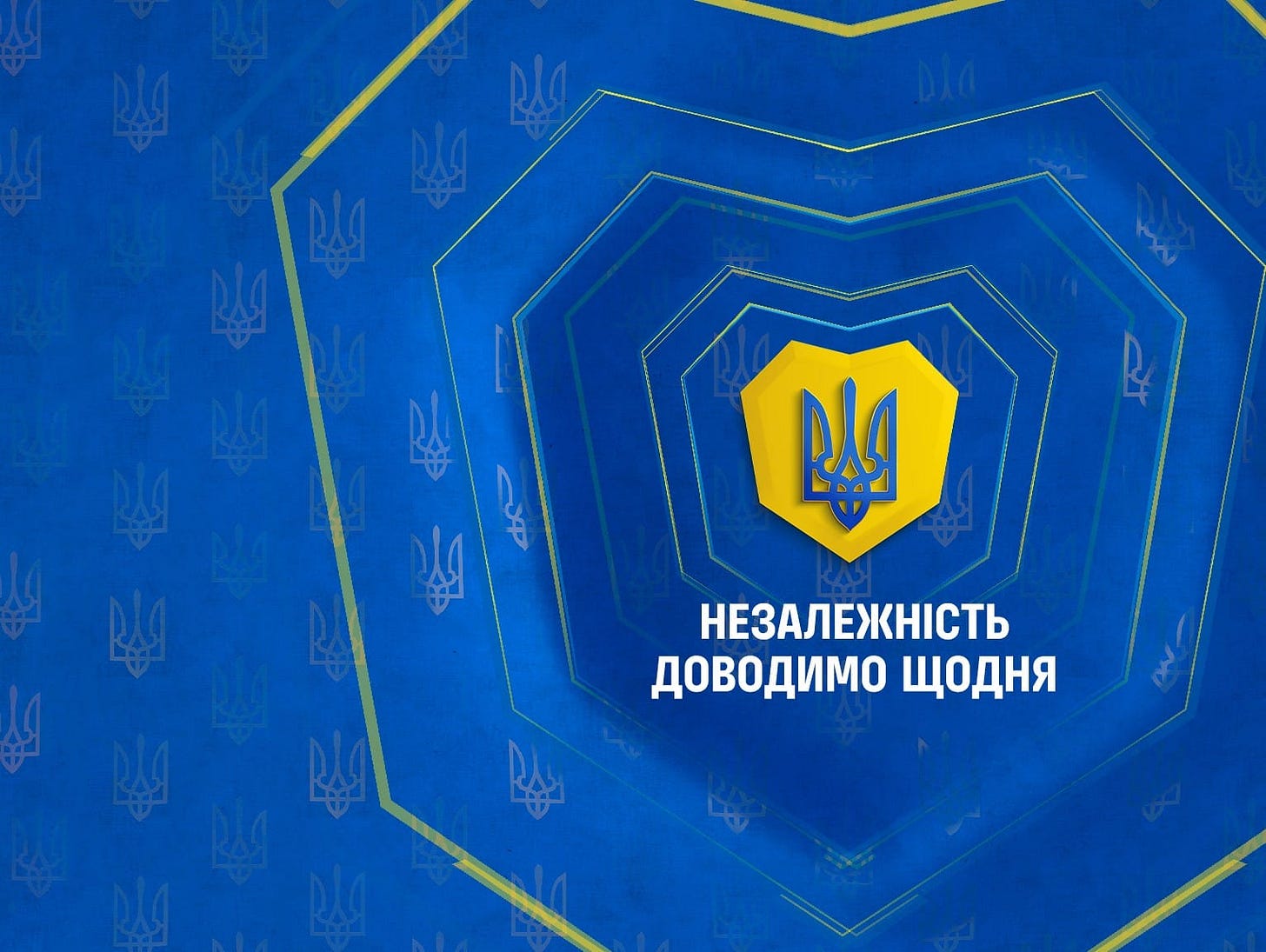Slava Ukraini! In early 2022 I began a Telegram channel aggregating news from a number of sources daily on the war in Ukraine. In June 2023 I began providing a daily draft for the Ukraine War Brief Podcast collecting news from over 70 sources daily, which formed the basis of the script. While the Podcast no longer exists I have continued to make this Brief available for my followers here on Substack for those who wish to keep up with the news from the war.
All the latest news on the Russo-Ukraine War 6 days per week
ALONG THE CONTACT LINE
GSAFU Morning Report
The General Staff of the Armed Forces of Ukraine in its Operational Information update at 22:00 on Dec 9 stated that day 1021of the full-scale invasion of the Russian Federation against Ukraine was about to begin.
During the past day, 151 combat engagements took place. Over the past 24 hours, the enemy carried out 34 air strikes, 681 drone strikes and almost 4,000 artillery strikes across the positions of Ukrainian forces.
At the same time, Ukrainian soldiers continue to inflict losses in manpower and equipment on the occupying troops, exhausting the enemy along the entire front line and continue to disrupt the plans of Russian occupiers to advance deeper into the territory of Ukraine.
Air Force Daily Report
Russian aerial attacks that began overnight continue into this morning as a result no report has yet been released.
The Russian Border Incursion
On the evening of Dec 9 the GSAFU stated that over the border in the Kursk region of Russia, Ukrainian defenders had repelled 10 Russian attacks, currently one engagement is ongoing. During the day Russia made 22 aviation strikes on their own territory, dropping 36 guided bombs.
The Institute for the Study of War (ISW), a US based think tank, in its Dec 9 Russian Offensive Campaign Assessment reported that Russian sources continued to claim that Russian forces seized Plekhovo (south of Sudzha) on Dec 8 and 9, but ISW cannot independently verify these claims. A Russian milblogger claimed that elements of the Russian 22nd Spetsnaz Brigade (Russian General Staff Main Directorate [GRU]), 30th Motorized Rifle Regiment (72nd Motorized Rifle Division, 44th Army Corps, Leningrad Military District [LMD]), 155th Naval Infantry Brigade (Pacific Fleet, Eastern Military District [EMD]), 810th Naval Infantry Brigade (Black Sea Fleet), "ArBat" Armenian Battalion (part of the "Pyatnashka" international volunteer brigade), and "Kurskiye Vityazi" detachment (a recently formed Kursk-based volunteer detachment) seized Plekhovo.
Russian milbloggers also claimed that Russian forces advanced in the Novoivanovka area (southeast of Korenevo), but ISW cannot independently verify these claims. A Ukrainian battalion operating in the Kursk direction published geolocated footage on Dec 9 showing the battalion repelling a Russian company-sized mechanized assault north of Darino (southeast of Korenevo).
Russian forces reportedly continued to attack in the direction of the Sumy Oblast border near Guevo and Gornal (west and southwest of Plekhovo, respectively) and near Kurilovka (northwest of Plekhovo). Elements of the Russian 1st Assault Company (51st Airborne [VDV] Regiment, 106th VDV Division) are reportedly operating in Darino; drone operators of the "Baksan" Drone Detachment are operating in the Kursk direction; and assault elements of the Russian 1427th Motorized Rifle Regiment (formed during 2022 partial mobilization) are operating near the Naydenov-Nechayev line (northeast of Sudzha).
Ukrainian officials deny Russian breakthrough on Sumy Oblast border
Ukrainian border and regional authorities dismissed reports of a Russian breakthrough near Oleksandria, stating defenses remain secure with no detected enemy movement. Euromaidan Press reports.
Ukrainian authorities have refuted claims about Russian forces breaching the border in Sumy Oblast, according to the regional military administration‘s report. Head of Sumy Oblast Military Administration Volodymyr Artiukh stated that information about Russian forces breaking through the border “does not correspond to reality.”
The denial came after DeepState analysts reported alleged Russian advancement near Oleksandria village in the Myropil community.
“Currently, there is no data from the military regarding any changes in the border situation,” Artiukh said, characterizing such reports as “enemy disinformation” aimed at spreading panic among the population.
State Border Guard Service spokesman Andrii Demchenko confirmed on Kyiv 24 TV channel that no Russian breakthrough was detected in the specified area, according to Liga.
The spokesman explained that marshy terrain in the area complicates any enemy attempts to advance or establish positions.
The Khortytsia operational-strategic group
(Responsible for the northeastern part of Ukraine. )
Kharkiv Sector: Over the last day Ukrainian Defense Forces repelled 5 Russian attacks in the area of Hlyboke and Vovchansk.
Kupyansk Sector: Russian Forces carried out 7 offensive actions against Ukrainian defensive positions near, Zahryzove and Lozova. 2 engagements are ongoing.
Lyman Sector: Russian Forces carried out 14 offensive actions against Ukrainian defensive positions near Zelenyi Hai, Nadiia, Hrekivka, Makiivka, Yampolivka and Torske.
Siversk Sector: In this sector, over the last day, there has been no significant change in the combat environment, however Russia did conduct several air strikes.
Kramatorsk Sector: Russian forces carried out 2 unsuccessful offensive actions against Ukrainian defences in the vicinity of Orikhovo-Vasylivka andChasiv Yar.
Toretsk Sector: Over the last day Russian forces carried out 8 offensive actions with air support near Toretsk, Shcherbynivka and Nelipivka. 2 engagements are ongoing.
The Tavria operational-strategic group
(Responsible for the central-eastern and southeastern part of Ukraine.)
Pokrovsk Sector : Over the last day in this sector, Russian Forces carried out 51 offensive actions against Ukrainian defensive positions in the vicinity of Myrolyubivka, Promin, Lysivka, Dachenske, Shevchenko and Chumatske. 5 engagements are ongoing.
Kurakhove Sector: Russia conducted 37 offensive actions in the vicinity of Zorya, Sontsivka, Stari Terny, Kurakhove, Dachne and Dalnje.
Vremivka Sector: Russian forces made 27 attempts to break through Ukrainian defences in the vicinity of Novosilka, Neskuchine, Sukhi Yaly and Kostiantynopolske. 6 engagements are ongoing.
Orikhiv Sector: In this sector, over the last day, there has been no significant change in the combat environment.
The Odesa operational-strategic group
(Responsible for Kherson, Qırım, (also known as Crimea) and the Black Sea.)
Prydniprovsk Sector: In this sector, over the last day, there has been no significant change in the combat environment. Russian forces made 3 unsuccessful attempts to dislodge Ukrainian units from their positions.
TEMPORARILY OCCUPIED TERRITORIES
Russians announce evacuation from Donetsk Oblast's Yenakiieve after alleged hit on ammo depot
Eyewitnesses say Ukraine hit a Russian ammo storage, and published footage showing a detonation. Ukrainska Pravda reports.
The local Russian-imposed "administration" announced the evacuation of the inhabitants due to the threat posed by the debris of detonating ammunition. Serhii Bozhyk, the city's so-called "mayor", specifically stated that residents would be transferred to a "safe" location.
Residents in the surrounding neighbourhoods were asked to stay away from the windows.
According to local Telegram channels, it was a Russian occupation army munitions storage in a residential area near a military training site. According to eyewitnesses, the facility may contain a large quantity of varied ammunition.
Yenakiieve is a major city in Donetsk Oblast, which has been held by Russian soldiers since 2014. The Russians use the city as one of their logistics centres, locating equipment and personnel and training them in the surrounding areas.
THE HOME FRONT
64% of Ukrainians reject talks with Russia without Western security guarantees – Poll
Sixty-four percent of Ukrainians oppose negotiations with Russia without Western security guarantees,New Voice reported citing a poll by INFO SAPIENS for the Center for New Europe, conducted Nov 15-27, 2024.
“64.1% of Ukrainians believe there should be no negotiations with Russia unless Ukraine receives real security guarantees from the West. The argument is that Russia would resume the war after a short pause,” said the organizers of the survey.
At the same time, about 30% of respondents support negotiations under any circumstances, believing that Ukraine does not have the resources for a war of attrition. The strongest support for negotiations comes from the 30–39 age group (nearly 40%).
Regionally, support for negotiations is strongest in the south and east of Ukraine, with 34.5% and 43.7%, respectively, while Kyiv shows the highest level of distrust (only 18%), and the western regions of Ukraine are nearly as skeptical (20%).
Nearly 40% of respondents believe Ukraine should only enter negotiations when Russia withdraws its troops (at least to positions held before the start of the full-scale invasion in 2022). Another 26.2% of Ukrainians are convinced that the precondition for negotiations should be security guarantees from Western countries to prevent further aggression.
Twelve percent of respondents oppose negotiations with Russia under any circumstances. As the organizers noted, last year’s poll showed much stronger support for this position, at 33.4%. Only 16% of respondents support negotiations without any preconditions.
The survey sample consists of 1,000 respondents. The margin of error does not exceed 3.1%, with a 95% probability, the organizers stated.
Results from a sociological survey by the Razumkov Center, conducted from Sept. 20 to Sept. 26, 2024, showed that 35% of Ukrainians believe negotiations with Russia could “achieve peace” and should begin now. Meanwhile, 48% disagreed with this statement.
Additionally, sociologists noted that the proportion of respondents who believe “negotiations with Russia should only be held after its troops are pushed back (withdrawn) to the 1991 borders” has decreased. Their share dropped from 61% to 49%, with 24% and 29%, respectively, disagreeing, the Razumkov Center concluded.
RUSSIAN WORLD
ISW - Russia faces staggering costs to maintain its war effort.
The Institute for the Study of War (ISW), a US based think tank, in its Dec 9 Russian Offensive Campaign Assessment reported that Russia continues to face staggering costs required to maintain its war effort against Ukraine, with mounting economic strain, labor shortages, and systemic corruption threatening the sustainability of the Russian defense industrial base (DIB). US Defense Secretary Lloyd Austin reported on Dec 7 that Russia has spent over $200 billion on its war in Ukraine and suffered at least 700,000 casualties since February 2022, with recent losses averaging 1,000 soldiers per day.
The Ukrainian Center for Countering Disinformation reported on Dec 9 that Russia's liquid assets in its National Welfare Fund dropped from $140 billion in Feb 2022 to $53.8 billion by Dec 1, 2024. The Center noted that Russia increasingly relies on Chinese yuan reserves and gold sales to cover its budget deficit and is committing a third of its national budget for 2025-2027 to defense spending, indicating an unsustainable prioritization of the war at the expense of economic stability.
Russian Prosecutor General Igor Krasnov claimed on Dec 9 that corruption crimes, including bribery, increased by nearly 30 percent in 2024 over 2023, with Russian authorities having disciplined over 30,000 Russian officials for corruption violations in 2024.
Russia's mounting economic pressures stemming from the war, paired with widespread corruption, labor shortages, and inefficiencies in Russia's DIB, will likely compound the cost of Russia's war and further undermine its ability to effectively sustain DIB operations while maintaining economic stability. ISW has previously observed reports of similar trends and statistics in the Russian economy, indicating that Russia's economic trajectory is unsustainable in the mid- to long-term and will increasingly strain its capacity to wage war against Ukraine.
Russia Takes a Political, Military and Economic Hit as Syria's Assad Falls from Power
Seven years ago, President Vladimir Putin traveled to Syria to meet with his ally, then-Syrian leader Bashar al-Assad, at Russia's Khmeimim air base in Latakia. The Moscow Times reports.
In a triumphant speech, Putin declared victory over Assad's enemies once and for all.
“If the terrorists raise their heads again,” he said of the Syrian opposition and the Islamic State terrorist group, “we will deal unprecedented strikes unlike anything they have seen.” - Putin 2017
Fast forward from 2017 to 2024, and Russia, bogged down in its war against Ukraine, has watched the Syrian regime fold to a lightning two-week insurgent offensive.
As Syria navigates its uncertain future, Assad's downfall carries considerable political, military and economic costs for Russia, which has long used Syria as a foothold for its influence in the Middle East.
Since intervening in the Syrian Civil War in 2015, Russia has positioned itself as a key power broker in the Middle East.
Moscow stepped in on Assad’s behalf after the mass protests of 2011 spiraled into civil war and jeopardized his hold on power. Over the years, Russia's backing helped Assad regain much of the territory he had lost to opposition forces and the Islamic State, cementing Moscow's role as a dominant player in the region.
The swift collapse of Assad's regime in 2024 has upended that narrative.
While Putin has yet to comment on Assad’s overthrow, his spokesman Dmitry Peskov admitted on Monday that Moscow was taken by surprise.
"What happened has surprised the whole world and, in this case, we are no exception," Peskov said.
The U.S.-based Institute for the Study of War described Russia’s inaction as the sign of a "strategic political defeat for Moscow."
“Russia's inability or decision to not reinforce Assad's regime” during the insurgents’ rapid offensive across Syria will “also hurt Russia's credibility as a reliable and effective security partner throughout the world, which will in turn negatively affect Putin's ability to garner support … for his desired multipolar world,” the ISW said.
Nikita Smagin, an expert on Russian foreign policy in the Middle East, said Moscow's inability to save Assad should be viewed through a longer-term lens.
"If you don't win a civil war with a quick blitzkrieg, you are likely to get bogged down in a protracted conflict, and sooner or later this will lead to defeat," Smagin told The Moscow Times, explaining the situation Assad found himself in.
With Assad now seeking refuge in Moscow, the Kremlin has yet to decide what exactly to do with the forces now in power in Syria, led by the Islamist alliance Hayat Tahrir al-Sham (HTS) and the Turkish-backed Syrian National Army umbrella group. For years, Russia has been on the opposite side of this power struggle and declared HTS a terrorist group.
Syria has also been pivotal for Russia's military strategy in the Middle East, hosting two strategically important sites on Syria's Mediterranean coast: the Hmeimim air base and the Tartus naval base, which plays a key role in supporting Russia's maritime operations in the region.
Following Assad's ousting, Russia appears to be preparing to withdraw its military assets from Syria, ISW said.
Russian troops also reportedly requested Ankara’s support for their safe exit from Syria, CNN Turk said Sunday.
Peskov said Monday that while it was premature to discuss the future of Russia’s military presence in Syria, negotiations were underway with the new authorities in Damascus to ensure the safety of Russian personnel and assets.
Experts suggest that Russia’s loss of its bases in Syria will likely significantly reduce its influence in the Middle East and disrupt its military logistics in Africa.
INTERNATIONAL NEWS
Ukraine to raise NATO invite, security guarantees at meeting with European allies.
Ukrainian President Volodymyr Zelenskiy will raise the issues of Ukraine being invited to join the NATO military alliance as well as security guarantees at a meeting with European partners this month, Kyiv said on Tuesday. Reuters reports.
Ukraine announced the meeting on Monday and said it would help coordinate a joint position and ensure Kyiv was in a strong position for potential talks and on the battlefield.
"One of the issues on the agenda of such a meeting will certainly be the issue we are discussing now of obtaining a membership application and the issue of security guarantees for Ukraine until it joins NATO," said Ihor Zhovkva, deputy head of the Ukrainian president's office.
He said there would also be discussions about military aid for Ukraine.
These issues were also raised at Zelenskiy's meeting with U.S. President-elect Donald Trump and French President Emmanuel Macron over the weekend, he said.
"It is absolutely clear that the issue of Ukraine's membership in NATO, unfortunately, remains unattainable for now. I mean, as long as Russian aggression against Ukraine continues, until we win. And so today... we need appropriate guarantees of our security before we join NATO," Zhovkva said.
German opposition leader tells Zelenskyy his government would stop making Ukraine fight one-handed.
Friedrich Merz, frontrunner in the race to become Germany's next chancellor, used an election-time visit to Kyiv to condemn his country's policy on arming Ukraine as akin to making the country fight with one arm tied behind its back. Reuters reports.
Merz, leader of the opposition conservatives, is a critic of Chancellor Olaf Scholz's refusal to follow Britain, France and the United States in sending Kyiv longer-range weapons capable of striking deep inside Russian territory.
Merz's centre-right party alliance is the clear favourite to unseat the Social Democrat, Scholz, in Germany's Feb. 23 vote, enjoying a lead of more than 10 percentage points in most polls.
"We want your army to be capable of hitting military bases in Russia. Not the civilian population, not infrastructure, but the military targets from which your country is being attacked," he told President Volodomyr Zelenskyy.
Scholz has resisted Zelenskyy's requests for Germany's Taurus cruise missile, whose range and power he said would bring an unacceptable risk of escalation and might be construed as tantamount to Germany joining the war.
Military experts believe the Taurus, with its bunker-busting warhead, could be instrumental in destroying targets like the Kerch bridge that links Crimea, the Ukrainian peninsula annexed by Russia in 2014, with Russia's mainland.
"With these range limits, we are forcing your country to fight with one hand tied behind your back," Merz said.
Germany is the second largest provider of financial and military support to Ukraine after the U.S. and hosts more Ukrainian war refugees - over a million - than any other country.
With a flagging economy, questions of war and peace, and Germany's capacity for hosting refugees all high on the public agenda, populist left and far-right parties are taking aim at the hitherto broad consensus on backing Ukraine.
Scholz and Merz have both made Ukraine a campaign centrepiece in different ways. Merz's visit follows Scholz's own overnight train journey last week for a coveted photo opportunity with Ukraine's leader.
Despite a track record of strong backing for Ukraine, Scholz, mindful of his more dovish voter base, now portrays himself as a peace candidate, warning voters against what he says is Merz's willingness to escalate a conflict with a nuclear-armed power.
"Only if Ukraine is strong will (Russian President Vladimir) Putin be prepared to enter into negotiations at all," Merz said on arrival in the capital, adding he wanted to assure the Ukrainian leadership of his conservative bloc's support.
Zelenskyy, thanking both Scholz and Merz for their visits and Germany for its support, echoed Merz on the armaments issue.
"Putin doesn't want to end this war. He must be forced to," Zelenskiy said. 'And he can only be forced if Ukraine is strong."
Operation Destabilise: NCA disrupts $multi-billion Russian money laundering networks
An international investigation, led by the UK National Crime Agency (NCA) - Operation Destabilise - has exposed and disrupted Russian money laundering networks supporting serious and organised crime around the world: spanning from the streets of the UK, to the Middle East, Russia, and South America. NCA reports.
Investigators have identified two Russian-speaking networks collaborating at the heart of the criminal enterprise; Smart and TGR.
Operation Destabilise is being revealed today as the US Department of the Treasury’s Office of Foreign Assets Control (OFAC) announces sanctions against the Russian-speaking men and women at the head of these networks, as well as four businesses linked to TGR.
A seventh individual, who was a global money laundering facilitator with strong links to one of the networks, has also been arrested by the NCA’s international partners.
As well as enabling UK-based criminals, Smart and TGR used their global reach to launder money for transnational crime groups such as the Kinahans. The notorious family-run crime syndicate, responsible for trafficking drugs and firearms into the UK and around the world, were sanctioned by the US in 2022.
They also helped Russian clients to illegally bypass financial restrictions to invest money in the UK, threatening the integrity of our economy. From late 2022 to summer 2023 the Smart network was used to fund Russian espionage operations.
NCA-coordinated activity has so far led to 84 arrests, with many already serving prison sentences, as well as the seizure of over £20m in cash and cryptocurrency.
Operation Destabilise uncovered a complex scheme whereby the networks collect funds in one country and make the equivalent value available in another, often by swapping cryptocurrency for cash.
This provides a mutually beneficial service, streamlining the movement of cash generated by crime groups in the West, while simultaneously laundering crypto for cyber criminals, and helping Russian oligarchs and elites to bypass sanctions.
The UK was a key hub, and the NCA worked closely with partners across UK law enforcement to conduct a series of operations linked to Destabilise. Investigators witnessed exchanges taking place at scale across the country where street-level cash handovers were followed almost immediately by a movement of cryptocurrency of the same value.
After being paid in crypto in exchange for their cash, criminal gangs would use the virtual currency to reinvest in their illicit business, buying more drugs or firearms without the need to move any physical money across borders. The financial service provided to such groups perpetuated their violent activity, enabling them to cause serious harm to communities across the UK.
“Operation Destabilise has exposed billion-dollar money laundering networks operating in a way previously unknown to international law enforcement or regulators.
“For the first time, we have been able to map out a link between Russian elites, crypto-rich cyber criminals, and drugs gangs on the streets of the UK. The thread that tied them together – the combined force of Smart and TGR – was invisible until now.
“The NCA and partners have disrupted this criminal service at every level. We have identified and acted against the Russians pulling the strings at the very top, removing the air of legitimacy that enabled them to weave illicit funds into our economy.
“We also took out the key coordinators that enabled the cash-based element of their operation in the UK, making it extremely difficult for them to operate here and sending a clear message that this is not a safe haven for money laundering.” - Rob Jones, National Crime Agency
On Dec 10 the UK government announced further sanctions on the entities and individuals involved. These announcements come on the back of a major NCA investigation last week – Operation Destabilise – that exposed and disrupted Russian money laundering networks supporting serious and organised crime around the world, further highlighting the harm caused by dirty money to UK and international security.
MILITARY & TECH
Ukraine’s Armed Forces adopt Droid TW robotic machine-gun systems.
The Ukrainian Ministry of Defense codified and approved the Droid TW 12.7, a robotic combat system equipped with a 12.7mm Browning machine gun for military use.
The tracked robotic platform has successfully completed combat trials, the ministry reported.
Key features of the Droid TW 12.7 include remote control via tablet, digital communication capabilities, and a tracked chassis designed to navigate difficult terrain. The system’s primary armament is a 12.7mm machine gun, positioning it as a significant addition to Ukraine’s technological military capabilities.
“In the conditions of modern warfare, technologies play a key role in ensuring battlefield superiority,” the Ministry of Defense stated.
North Korea Will Get MiG-29 and Su-27 in Exchange For Soldiers.
In exchange for soldiers from the DPRK, Russia will transfer an unspecified number of MiG-29 and Su-27 fighter aircraft to the North Korean regime. Defense Express reports citing a senior U.S. officer in the Pacific, the initiative to send its troops to fight in Ukraine was coming from North Korea itself. Currently, the Korean soldiers are not participating in combat operations yet remain deployed in the zone of active hostilities.
These insights were stated by the chief of the United States Indo-Pacific Command, Admiral Samuel Paparo, as reported by Aviation Week. Despite the old MiG-29s and Su-27s not being as good as new fifth-generation fighters, they are still "formidable," Paparo said during his speech at the Reagan National Defense Forum.
He also believes that in addition to (relatively) modern aircraft, North Korea may also ask for technologies to produce ballistic missiles and air defense systems from Russia in exchange for its manpower.
Defense Express notes that, on the one hand, until now it was believed that North Korea would get far superior Su-35 fighters from Russia. At least that was the topic in the air after supreme leader Kim Jong Un visited the Russian aircraft factory in Komsomolsk-on-Amur in the fall of 2023 where the Su-35s are produced.
On the other hand, considering the current state of the DPRK's aviation, even a transfer of MiG-29s and Su-27s would be a serious power-up in terms of quality.
Presently, the most modern models in the North Korean aviation fleet are the 18 MiG-29s and 34 Su-25s received from the USSR back in the 1980s. The core still consists of 50 MiG-23s, around 200 MiG-21s, 200 MiG-17s, and MiG-19s.
How many of these museum pieces are still airworthy is anyone's guess, but probably its not a lot. The real question is how many aircraft Russia could provide North Korea.
Based on The Military Balance assessment from the IISS, as of early 2024, the russian Aerospace Forces operated:
about 70 Soviet-era MiG-29/MiG-29UBs,
14 modernized MiG-29SMTs and two MiG-29UBTs;
12 Su-27s and 18 Su-27UBs,
47 Su-27SMs and 24 Su-27SM3s, and
the Russian Navy also had 18 Su-27s in the basic version.
With these figures in mind, we can assume that the number of aircraft planned for transfer from russia to the DPRK may depend on the level of their technological development. That is, which modernizations the Kremlin will choose to share with its North Korean partners.
If only the oldest types are selected, dictator Kim can expect up to a few dozen fighters, or a more reserved number if their improved versions are sent instead.
That’s it for today’s Brief folks if you would like to keep up with events in Ukraine daily please consider subscribing.
Feel free to share this update with your friends. Heroyam Slava!







